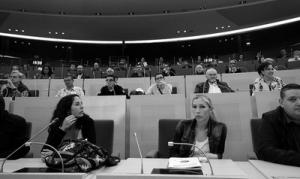Emerging threatsSocial sciences are best hope for ending debates over climate change
The toxicity of the public debate in the United States over climate change is increasing, and to detoxify the debate, we need to understand the social forces at work. We must recognize that the public debate in the United States over climate change is not about carbon dioxide and greenhouse gas models; it is about opposing cultural values and worldviews through which that science is viewed. The opposing sides have less to do with the scientific basis of the issue and more to do with the ways in which people receive, assess, and act upon scientific information. To move forward, we have to disengage from fixed battle on one scientific front and seek approaches that engage people who are undecided about climate change on multiple social and cultural fronts. Only by broadening the scope of the debate to include this social and cultural complexity can we ever hope to achieve broad-scale social and political consensus. More scientific data can only take us so far; engaging the inherently human aspects of this debate will take us the rest of the way.

Planetary Global Citizen meeting in France this past June // Source: commons.wikimedia.org
In March 20015, California Governor Jerry Brown described Senator Ted Cruz as unfit to run for office because of his “direct falsification of the existing scientific data” on climate change. Cruz fired back that “global warming alarmists” like Brown “ridicule and insult anyone who actually looks at the real data.” Here we go again. This is but one example of the toxicity of the public debate over climate change.
To detoxify the debate, we need to understand the social forces at work. On the one side, this is all a hoax, humans have no impact on the climate and nothing unusual is happening. On the other side, this is an imminent crisis, human activity explains all climate changes, and it will devastate life on Earth as we know it. Amidst this acrimonious din, scientists are trying to explain the complexity of the issue.
To reach some form of social consensus on this issue, we must recognize that the public debate over climate change in the United States today is not about carbon dioxide and greenhouse gas models; it is about opposing cultural values and worldviews through which that science is viewed.
The opposing sides in this rhetorical war have less to do with the scientific basis of the issue and more to do with the ways in which people receive, assess, and act upon scientific information. To move forward, we have to disengage from fixed battle on one scientific front and seek approaches that engage people who are undecided about climate change on multiple social and cultural fronts.
Jury trial
To begin, we have to stop focusing a disproportionate amount of attention on the extreme poles of the debate, those who are distorting the science and engaging in a contest in which they are simply trying to “win.”
Attention must focus less on the small minority of active deniers and more on the vulnerability of the majority to their influence.
In the words of Tony Leiserowitz from Yale University, “the proper model for thinking about the climate debate is not a boxing match, but a jury trial. We can never convince the die-hard skeptics, just like a prosecutor will never convince the defense lawyer, and doesn’t try. Rather, we should focus on convincing the silent jury of the mass public.”
